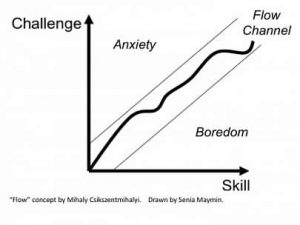Flow

“Flow” concept by Mihaly Csikszentmihalyi
Happiness exercise: How to remove stress and boredom at work
Here’s a story about the psychologist and rock climber who discovered how to remove stress and boredom at work. Psychologist Mihaly Csikszentmihalyi (“cheeks-sent-me-high”) is a professor at Claremont Graduate University and spent most of his career on the faculty at the University of Chicago. As a young psychologist, Mike, as he’s known to his colleagues, became an expert rock climber. He went on the weekends with friends to cliffs where the friends drilled their own bolts into the rockface in order to climb. Mike observed that on the days he was rock climbing, sometimes he wouldn’t notice where the time went, whether he and his friends had had lunch or not, or what climbs they had done. As a psychologist, he called this feeling FLOW. It’s been described as being “in the zone” or being “one with the music.”
What Flow Feels Like
Think about a time in your day yesterday that you found yourself completely caught up in the moment: A stretch of time at your desk with no interruptions? Preparing the pre-bed ritual with your child? Thinking of nothing in particular and driving on the highway?
Csikszenmihalyi defines flow as the point where your challenges meet your skills. Painters, athletes, musicians, computer programmers, financial traders, writers all describe themselves as regularly experiencing flow.
If you look at the above flow chart, you can see that flow can happen at high skills and high challenge, such as an uninterrupted full day of programming or at low skills and low challenge, such as that comfortable zone when driving home and not thinking about anything.
This flow framework can be used to remove boredom and stress at work.
The Bored Employee
As an executive coach, I was working with an entrepreneur who ran a company of about 30 employees. Let’s call him Walter. Walter had one employee who had lately been acting bored, not contributing much to his work, and hanging back in group discussions. Walter had considered promoting this employee, but hesitated because of the recent bored attitude.
I asked Walter where his employee would fall on the flow chart in skills and challenges. Walter said that the employee was one of his best and had been constantly improving in skills, but was probably low on challenges recently. What can you change if you’re bored (high on skills and low on challenges)? You can increase challenge, and this is what Walter did for the employee. Or you can decrease skill! What does that even mean: “decrease skill”? That means use other skills at work. Play with using different skills to meet that level of challenge. Not only will you grow your other skills, but you may move from boredom to the diagonal flow super-highway.
You Under Stress
Similar to the bored employee, think back to the most stressful moment at work in the past week. Think how your adrenaline was pumping, how you were rushing from one thing to another, how you weren’t sure whether your presentation would go well.
Stress is removable. Here is one technique to help you start. Where were you on the above flow chart? I’ll bet you were in the anxiety area: high challenge and low skills. So what two things can you do? Decrease the challenge (i.e. delegate, prioritize, ask for help), or increase your skill (figure out where you may need more training or more improvement).
FLOW: The Holy Grail Between Skills and Challenges
If you are bored, think of Mike Csikszentmihalyi, the rock climber and psychologist. Think of what two actions he would always recommend to you to get back on the flow super-highway: to change skills or challenges.
As Steve Jobs said in this Stanford commencement speech, “…for the past 33 years, I have looked in the mirror every morning and asked myself: “If today were the last day of my life, would I want to do what I am about to do today?” And whenever the answer has been “No” for too many days in a row, I know I need to change something.”
If you’re bored, if you’re stressed, change something. Move your skills or your challenges. Enjoy being “one with the music.”
Senia Maymin’s column highlights exercises from the field of positive psychology to increase happiness, resilience, and productivity.

Senia Maymin, MAPP Bio
Senia Maymin researches change and runs a Web site of daily research tips for happiness and success.
Learn More